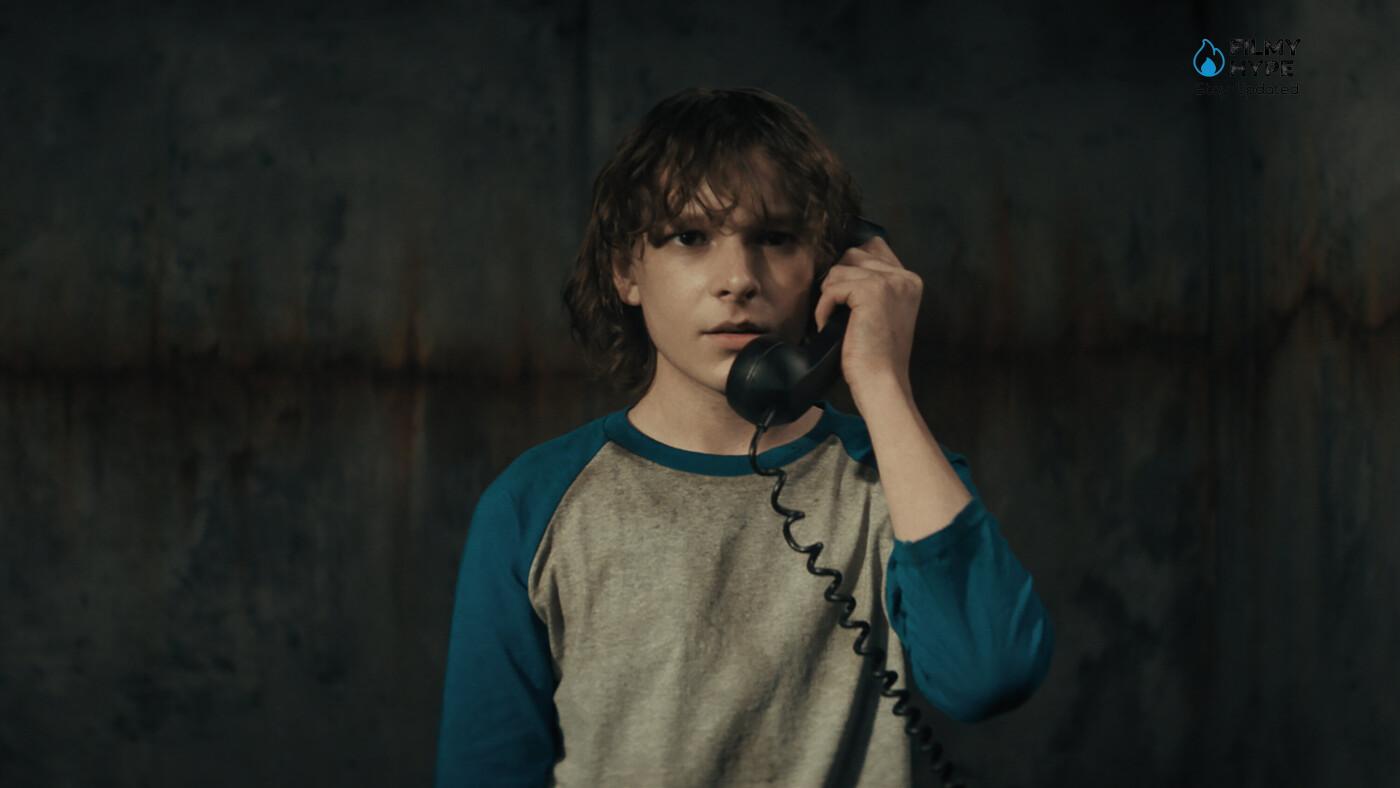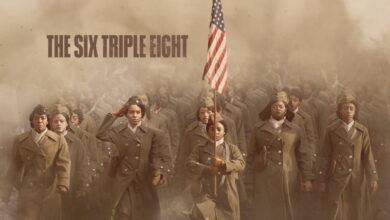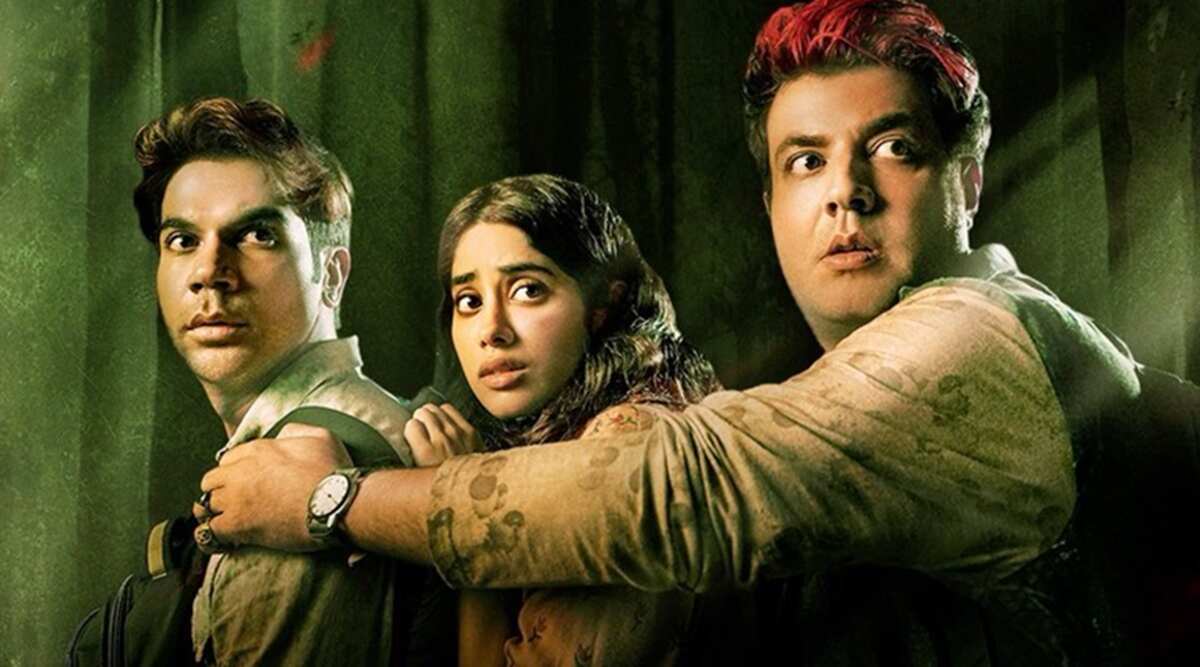The Black Phone Review: A Horror Movie That Stands Out In The Current Landscape
Star Cast: Ethan Hawke, Mason Thames, Madeleine McGraw, Jeremy Davies, and ensemble.
Director: Scott Derrickson
Filmyhype.com Ratings: 3.5/5 (Three and a half stars)
Thriller/horror, more horror than thriller, The Black Phone, directed by Scott Derrickson with Mason Thames, Madeleine McGraw, Jeremy Davies and Ethan Hawke, arrives in cinemas on 24 June 2022. Only at the cinema, a Universal Pictures International Italy distribution. It produces Blumhouse, which is an institution and an adequate guarantee of this kind. After taking a break from the world of horror with Doctor Strange (2016), Derrickson returns to his comfort zone with an intriguing and anguished feature film. Collaborating again with Ethan Hawke (Sinister), the director puts together a story that makes you tremble but that is also able to involve those who are not too familiar with the world of horror.

Like any good horror, this is good horror it works as an interactive map of the genre. There is a bit of everything. Truculent physicality, an insistent and insistent mood, the fantastic deviation, let’s say more correctly supernatural, a realistic photograph of reality, especially sentimental, of its protagonists. The melancholy sense of deviant innocence and maybe even some humorous shortcuts. Scott Derrickson lost the second Doctor Strange to write and direct this film here and will hardly have reason to regret the choice. Her very personal sliding door of him is the adaptation of the story of the American son of art Joe Hill and which is called The Black Phone.
The Black Phone Review: The Story
The ordinariness at the beginning of The Black Phone is already a scary scenario, but the film dips even lower. Finney Shaw is a shy 13-year-old boy. He lives with his abusive father and younger sister Gwen in the American province. Their seemingly quiet town is the setting for a mysterious kidnapper of kids: The Grabber (Ethan Hawke). After the disappearance of a couple of school friends, Finney is also a victim of the serial killer. Kidnapped in broad daylight, Finney is locked up in a half-empty basement: a small window, a mattress and a disconnected phone are all that. The Grabber was left in the room. Surprisingly, the phone starts ringing through it, and Finney manages to have otherworldly conversations with the killer’s previous victims. The suggestions received over the phone and the mystical dreams of Finney‘s little sister seem to be the only ways to try and save the boy before The Grabber unleashes his wrath.
An anonymous suburb in Colorado, 1978. Everything is normal except for the child predator known by the unwelcoming nickname of The Grabber (Ethan Hawke). He lures by pretending to be a magician, black balloons, improbable make-up, the van in which he goes around, black too, protected by the same strange spell that guards the anonymity of Diabolik’s Jaguar; practically it is the only model of the state with those characteristics, there was one that makes two and two, but no. There are also smart kids, their names are Finney and Gwen, they know better than all the (fairly) useless adults around them.
The Black Phone is the story of Finney (Mason Thames) and Gwen (Madeleine McGraw). Brothers, very close, the mother is gone and the father, Jeremy Davies, it’s awful from any angle you want to judge it. Gwen and Finney knew some of the missing boys very well. Finney is the typical shy and sensitive guy who doesn’t believe in violence but is still forced to grow up in the United States. Gwen is the exact opposite, she’s casual, and she’s not afraid to make her presence felt when needed, be it tidying up the police with a couple of peppery phrases or smashing a kid’s head with a stone. Gwen has an unfiltered relationship with Jesus, seeing is believing (!), But above all she has a “gift” that will come in very handy when things get bad.
Nobody knows exactly what happens to the missing boys, guess nothing good. The chance to find out is the kidnapping of Finney. His cell is a dingy soundproof basement. The predator is shown only masked, from a distance Gwen tempts them all by questioning her visions, combining little. There is a black telephone on one wall of the prison. He never hears it ring, Ethan Hawke, but we hear it and Mason Thame, she feels it. At the other end of the line is unexpected help. Friendly voices, a little confused about where and when, help the boy to get by in the darkest hour by offering advice, ideas, and painful memories. The monster stages a rather perverse game with its young prey, accepting or rejecting it can only give a little more time. Not salvation, that Finn will have to earn it by learning to fight.
The Black Phone Review And Analysis
There is strong attention to human detail that guarantees The Black Phone a dignified depth, a thickness that isolates it and distinguishes it from most contemporary horror, more attention to physical shock and a stereotyped and rapid characterization. In a cast of rookie faces and consummate character actors (Jeremy Davies) it’s up to Ethan Hawke, here unusually bad, very bad, to carry the cross of prestige and palatability to the public. He acts constantly disguised, masked, his is a work on the edge of the character; the pose, the intonations, the “legibility” of the gaze. The film, without detracting from the valuable work of the Italian dubbing cast, should be experimented with in the original language precisely to better grasp the gallery of nuances that structure the disturbing emotionality of a villain of which we know very little indeed.
The Black Phone has no interest in clarifying the biographical background of the villain, fortunately. The unexplained, allusive, opaque evil is intrinsically more cinematic because it is in the mystery, in the ambiguity that it finds its granite reason for being. On the other hand, the film works because it knows how to dose its ingredients economically. The dialectic between the real and the supernatural is managed with sobriety, the never baroque story points to the essentiality of emotion, not overloaded. The oppression in the air and the mood of gloomy melancholy that permeates life in this small suburban community are tempered with ironic flashes.
We are not around Stranger Things; in no way the focus of The Black Phone is on the pleasure of historical reconstruction and the pop re-enactment of the sentiment of an era. The film limits itself to defining the essential coordinates of the historical reference quadrant and then dedicates itself to the main objective, which is the story of a young innocent wounded by a mature evil. A dark training path, the young Finn who learns the hard way to deal with evil and to grow, challenging fears and insecurities thanks to the support of a generational solidarity network, evoked here by looking at the pure irrational. Praise of the creativity, of the cunning, of the hard skin of the boys permeated with mistrust towards the symbolic and real fathers; ideologically, Truffaut would have liked it. What remains outside the perimeter of the film, understandable but also sin is a more elaborate discourse on the aftermath, that is, on the impact of this unexplained evil on the intimate and public life of the main characters and the community.

The Black Phone shows a paranormal race against time. Initially, Finney and Gwen’s connections to the otherworldly are dwarfed by the adults, especially their alcoholic and abusive father (Jeremy Davies). Gradually, however, the police realize that the rationality used in the investigation fails to understand the absurdity of The Grabber’s kidnappings. Law enforcement is the one to ask Gwen for help and to appeal to her paranormal dreams. As absurd as it may be, the road traveled by the two brothers becomes minute by minute the only one useful for investigations.
A compliment to the cast of the film is needed. Ethan Hawke (Stockholm Robbery, Moon Knight), most of the time hiding behind a mask, is perfect in the role of the psychopathic bipolar killer. Unable to use his face, Hawke uses his voice and body to generate distress in his victims as well as in the viewer. Moving in the shadows and whispering in a falsely accommodating voice, the actor manages very well to create a tense atmosphere. Finney and the audience know that the beast inside him could explode at any moment and, for that very reason, they are terrified.
In addition to the big-name behind the executioner at the center of the film, the two young performers are no different. Mason Thames (Finney) does well in the part of the shy and insecure, sensitive, and therefore bullied kid. Seeing the transformation of the character in a situation on the verge of survival is truly compelling. Madeleine McGraw, the young actress who plays Gwen Shaw, is no exception: his character is perhaps the most layered one, struggling with a violent father, cumbersome dreams, and a missing brother. All the pressures of the adults around her weigh on her. The girl’s emotionality is perfectly rendered by the actress, who can go from laughter to tears without ever seeming forced. In general, the younger performers are the highlight of the film.
The Black Phone is a pleasant film to watch also in terms of aesthetics. There is a recognizable style within the various scenes. Director of photography Brett Jutkiewicz chooses vintage ocher and gray setting that proves to be the ideal setting for a scary story. Certainly, the collaboration with Blumhouse, a well-known brand in the horror genre, gave the right push in terms of well-constructed images. Nothing seems too fake or absurd.
The Black Phone Review: The Last Words
In conclusion, The Black Phone is a horror movie that stands out in the current landscape. By detaching himself from the stereotype of the low-budget film, built on carnage and screams, the director manages to generate anguish authentically: through a creepy story that, in many respects, is plausible and real. Fear springs from the scenes without being forced. Right from the opening credits, Derrickson perfectly conveys the idea behind the film: even in everyday ordinary life, panic situations can arise.







